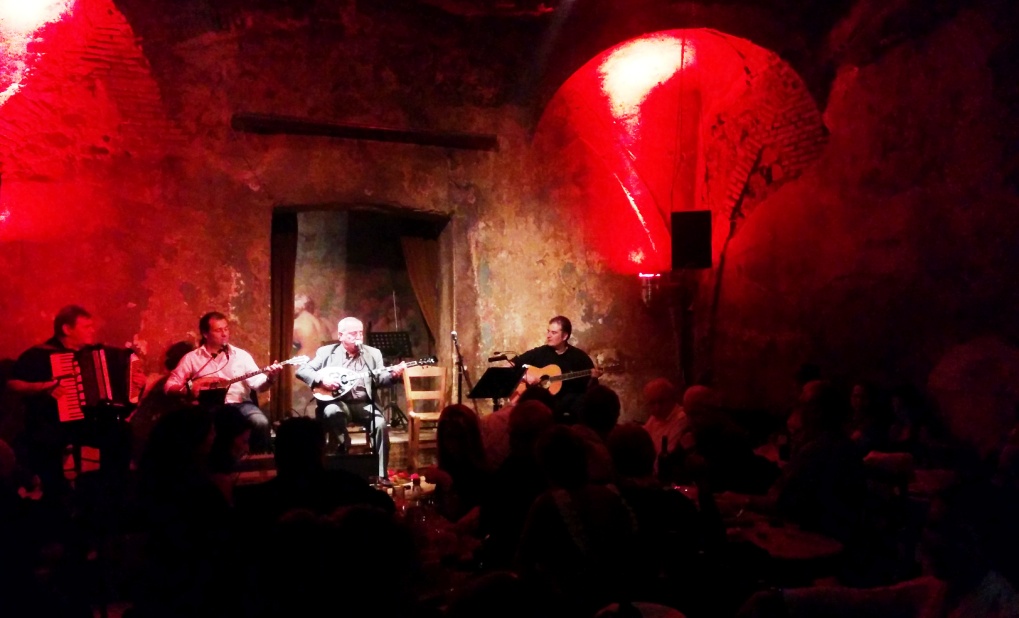Melancholy makes a comeback

It is around midnight in the former Ottoman steam bath in the Athens district of Petralona. The musicians appear on stage and begin to play the old songs of the desperate and the stranded. Here in the Hamam Club, the singer Manolis Dimitrianakis gives his all performing songs of sorrow and loss. The public sings along. They drink whisky and wine and plates with flowers are already set on the tables. Whenever a particularly moving passage is sung, spectators throw flowers onto the stage.
The performer plays rebetiko, Greek blues. He plucks his bouzouki, a bulbous stringed instrument similar to a lute. Way back when, rebetiko was performed in the dives and taverns of the port city of Piraeus. Since the economic crisis, the one-time underground music with its melancholic vocals has experienced a comeback.
Blend of Orient and Occident
The story of rebetiko began around a hundred years ago during a massive refugee crisis. The blend of Eastern and Western influences met with rapid success. The Oriental elements were brought by Ottoman Greeks who had lived within the territory of today's Turkey. The Greeks from Piraeus, in turn, despite lives of drudgery and bitter poverty, sang defiant satirical songs about smoking hashish, prostitution and social inequality. It would take a bloody war to bring the two groups together.
As the First World War drew to a close, Greece embarked on a military campaign to conquer a large part of Turkish territory. At the time, some 140,000 Greeks lived in the port city of Smyrna (Izmir). The Greco-Turkish war effectively ended in 1922 with Smyrna being overrun by Turkish troops under the command of Kemal Ataturk. Hundreds of thousands were forced to flee. This coming September marks the 95th anniversary of the "Catastrophe of Smyrna", as the Greeks call the event. The Turks, on the other hand, refer to it as the "War of Independence". In 1923, the Treaty of Lausanne stipulated a population exchange between Greece and Turkey, whereby 1.5 million Christians from Asia Minor were resettled in Greece and around 500,000 Greek Muslims moved to Turkey.
Hundreds of thousands of refugees arrived in Piraeus, where they lived among the dock workers, prostitutes and petty criminals. Temporary shelters were set up, in which Ottoman Greeks resided together with their fellow refugees for years.
Among them was Markos Vamvakaris, one of the best known rebetiko musicians from the island of Syros, who together with a musician from Piraeus and two refugees from Smyrna, formed a band and instantly became famous. The difficult living conditions in close quarters resulted in deep friendships being formed between local musicians and those from Smyrna. They played together in local coffee houses and even women played in their bands.
Of dives and hashish dens
They also played together in the "tekedes", the local hashish dens. The result was a melancholic sound with Greek, Sephardic and Armenian influences. Some rebetiko musicians played the clarinet, an instrument which was brought to Greece by Roma musicians. The origins of the word "rebetiko" remain unclear. Some say it stems from the Turkish word "harabati", which translates as "good-for-nothing" or "drunkard".
Despite its rapid success, rebetiko initially maintained its bad reputation and continued to be regarded as the folklore of the destitute and music for derelicts. Rebetiko musicians wore hats, suits and moustaches; swearing and vulgar language was all part of the act. The poorest of the musicians crafted their own instruments from a hollowed-out gourd, a piece of wood and wires.
Those on the right loathed the sub-culture on account of its Ottoman influences. In 1936, the Greek dictator Ioannis Metaxis banned the music and had its performers imprisoned. Rebetiko musicians fled from Piraeus and Athens northwards to Thessaloniki, where, supposedly, the chief of police was a fan of rebetiko. He is said to have personally supplied musicians with hashish in payment for their performances.
Initially the communists also spurned rebetiko. They regarded it as the music of the lumpenproletariat. Until, that is, the melodies were discovered by the then communist Mikis Theodorakis. With his militant compositions, Theodorakis became a hero of the resistance movement during the period of the Greek military junta (1967-1974).
Return of the Greek blues
He later became world famous with his musical score to the film "Zorba the Greek". After the fall of the junta, rebetiko and especially its love songs, became firmly rooted even among the Greek middle class and developed a cult following. In the wake of wars and dictatorships, as things gradually got better for the population, rebetiko lost its popularity – up until the current economic crisis, when the Greeks suddenly rediscovered their blues.
Today, the reggae band Locomondo performs its own versions of old rebetiko hits. Their interpretation of the old love song "Frangosyriani" can be heard in the film "Soul Kitchen" by the German-Turkish director Fatih Akin.
The band's singer Markos Koumaris recently told the newspaper "Griechenland Zeitung" that "reggae and rebetiko are popular music styles that emerged from the fusion of two cultures." In reggae, the rhythms of slaves brought to the Caribbean from Africa blend with the Western harmonies of the colonialists. "Both styles came from the underground – they are forms of popular music that are simply constructed, very danceable, yet also political."
The Greek nostalgia for Smyrna not only lives on in rebetiko, but is also evident in certain districts of Athens. For example, in the district of Nea Smirni (New Smyrna), where many refugees had settled, there is a park that recalls a martyr of the time. It is named after Chrysostomos, the archbishop of Smyrna. The Orthodox priest was lynched by a Turkish mob and his body fed to the dogs.
Mey Dudin
© Qantara.de 2017
Translated from the German by John Bergeron
